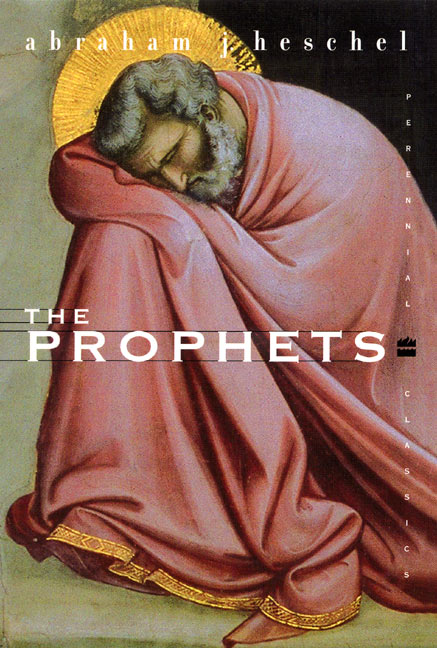This chart is especially helpful because it also lists the prophets alongside the kings, so you can see when they were prophesying. At the end of week 26, we begin reading the prophets. I have avoided looking ahead to see how George Guthrie has organized the Bible so that I will be surprised along the way, but it looks like the rest of the content of Kings/Chronicles will be set besides the prophets who were prophesying at the time. We have read about many prophets up until this point - Elijah, Elisha, etc - but now we move to those that have entire books named after them, starting with Jonah and then moving on to the prophet Amos. Traditionally, the prophets are divided into two categories - the major prophets (long prophetic books) and the minor prophets (shorter books). So far we have read two of the minor prophets first - Jonah and Amos - because chronologically they prophesied first of the 17 prophets who have a book with their name. 2 down, 15 to go!
 Abraham Heschel's book The Prophets serves as a wonderful companion to reading the prophetic books. Heschel was a 20th century Jewish theologian who wrote beautifully about the prophetic role - what the prophet is doing and why he says what he says and speaks in the way that he speaks. Heschel begins the introduction in this way: "This book is about some of the most disturbing people who have ever lived: the men whose inspiration brought the Bible into being - the men whose image is our refuge in distress, and whose voice and vision sustain our faith." It's a wonderful book with rich descriptions of the prophets, whose behavior and visions can seem strange to us. They may seem no less strange to you after reading Heschel, but he sheds light on the prophetic calling, and I can't help but use the word "beautiful" again to describe his manner of writing. I'm looking forward to rereading the other 15 prophets and being reminded of their intense message of God's love and of God's disappointment over his people's rejection of him.
Abraham Heschel's book The Prophets serves as a wonderful companion to reading the prophetic books. Heschel was a 20th century Jewish theologian who wrote beautifully about the prophetic role - what the prophet is doing and why he says what he says and speaks in the way that he speaks. Heschel begins the introduction in this way: "This book is about some of the most disturbing people who have ever lived: the men whose inspiration brought the Bible into being - the men whose image is our refuge in distress, and whose voice and vision sustain our faith." It's a wonderful book with rich descriptions of the prophets, whose behavior and visions can seem strange to us. They may seem no less strange to you after reading Heschel, but he sheds light on the prophetic calling, and I can't help but use the word "beautiful" again to describe his manner of writing. I'm looking forward to rereading the other 15 prophets and being reminded of their intense message of God's love and of God's disappointment over his people's rejection of him.
No comments:
Post a Comment